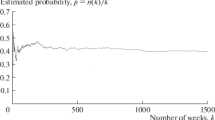Abstract
This article sketches a theory of objective probability focusing on nomic probability, which is supposed to be the kind of probability figuring in statistical laws of nature. The theory is based upon a strengthened probability calculus and some epistemological principles that formulate a precise version of the statistical syllogism. It is shown that from this rather minimal basis it is possible to derive theorems comprising (1) a theory of direct inference, and (2) a theory of induction. The theory of induction is not of the familiar Bayesian variety, but consists of a precise version of the traditional Nicod Principle and its statistical analogues.
Similar content being viewed by others
References
Barnard, G. A.: 1949, ‘Statistical Inference’, Journal of the Royal Statistical Society BII, 115–49.
Barnard, G. A.: 1966, ‘The Use of the Likelihood Function in Statistical Practice’, Proceedings V Berkeley Symposium on Mathematical Statistics and Probability I, 27–40.
Barnard, G. A.: 1967, ‘The Bayesian Controversy in Statistical Inference’, J. Inst. Actuar. 93, 229–69.
Birnbaum, Allan: 1969, ‘Concepts of Statistical Inference’, in S. Morganbesser, P. Suppes, and M. White (eds.), Philosophy, Science, and Method, St. Martin's Press, New York, pp. 112–43.
Chisholm, Roderick: 1957, Perceiving, Cornell University Press, Ithaca.
Chisholm, Roderick: 1977, Theory of Knowledge. 2d. edn., Prentice Hall, Englewood Cliffs NJ.
Chisholm, Roderick: 1981, ‘A Version of Foundationalism’, Midwest Studies in Philosophy, eds. P. A. French, T. E. Uehling, and H. K. Wettstein, University of Minnesota Press, Minneapolis, Vol. V, pp. 543–64.
Cox, D. R.: 1958, ‘Some Problems Connected With Statistical Inference’, Annals of Mathematical Statistics 29, 357–63.
Dempster, A. P.: 1964, ‘On the Difficulties Inherent in Fisher's Fiducial Argument’, Journal of the American Statistical Association 59, 56–66.
Dempster, A. P.: 1966, ‘Review of The Logic of Statistical Inference’, Journal of the American Statistical Association 61, 1233–35.
Doyle, J.: 1979, ‘A Truth Maintenance System’, Artificial Intelligence 12, 231–72.
Edwards, A. W. F.: 1972, Likelihood, Cambridge University Press, Cambridge.
Etherington, D. W.: 1983, Formalizing Nonmonotonic Reasoning Systems, Computer Science Tech. Report No. 83-1, University of British Columbia, Vancouver BC.
Fisher, R. A.: 1921, ‘On the ‘Probable Error’ of a Coefficient of Correlation Deduced From a Small Sample’, Metron I(Pt. 4), 3–32.
Fisher, R. A.: 1922, ‘On the Mathematical Foundations of Theoretical Statistics’, Philosophical Transactions of the Royal Society 222 (Series A), 309–68.
Gillies, D. A.: 1973, An Objective Theory of Probability, Methuen, London.
Goodman, Nelson: 1955, Fact, Fiction, and Forecast, Harvard University Press, Cambridge MA.
Hacking, Ian: 1965, Logic of Statistical Inference, Cambridge University Press, Cambridge.
Kolmogoroff, A. N.: 1933, Grundbegriffe der Wahrscheinlichkeitsrechnung, Julius Springer, Berlin.
Kyburg, Henry, Jr.: 1961, Probability and the Logic of Rational Belief, Wesleyan University Press, Middletown CT.
Kyburg, Henry, Jr.: 1970, ‘Conjunctivitis’, in Marshall Swain (ed.), Induction, Acceptance, and Rational Belief, D. Reidel, Dordrecht, pp. 55–82.
Kyburg, Henry, Jr.: 1974, The Logical Foundations of Statistical Inference, D. Reidel, Dordrecht.
Kyburg, Henry, Jr.: 1983, ‘The Reference Class’, Philosophy of Science 50, 374–97.
McCarthy, J.: 1980, ‘Circumscription — a Form of Nonmonotomic Reasoning’, Artificial Intelligence 13, 27–39.
McCarthy, J.: 1984, ‘Applications of Circumscription to Formalizing Common Sense Knowledge’, Proceedings of the Nonmonotonic Reasoning Workshop, New Platz NY, pp. 295–324.
McDermott, D. V.: 1982, ‘Nonmonotonic Logic II: Monmonotonic Modal Theories’, J. ACM 29(1), 33–57.
McDermott, D. V. and J. Doyle: 1980, ‘Nonmonotonic Logic I’, Artificial Intellience 13, 41–72.
Nute, D.: 1986, LDR: A Logic for Defeasible Reasoning, ACMA Research Report No. 01-0013, University of Georgia, Athens GA.
Nute, D.: 1987, ‘Defeasible Reasoning’, Proceedings of the Twentieth Annual Hawaii International Conference on Systems Sciences, University of Hawaii, Honolulu, pp. 470–77.
Nute, D.: 1988, ‘Defeasible Reasoning: a Philosophical Analysis in Prolog’, in J. Fetzer (ed.), Aspects of AI, D. Reidel, Dordrecht, pp. 251–88.
Pollock, John: 1967, ‘Criteria and Our Knowledge of the Material World’, The Philosophical Review LXXVI, 28–60.
Pollock, John: 1968, ‘What is an Epistemological Problem’, American Philosophical Quarter 5, 183–90.
Pollock, John: 1971, ‘Perceptual Knowledge’, Philosophical Review LXXX, 287–319.
Pollock, John: 1974, Knowledge and Justification, Princeton University Press, Princeton.
Pollock, John: 1974a, ‘Subjunctive Generalizations’, Synthese 28, 199–214.
Pollock, John: 1976, Subjunctive Reasoning, D. Reidel, Dordrecht.
Pollock, John: 1983, ‘A Theory of Direct Inference’, Theory and Decision 15, 29–96.
Pollock, John: 1983a, ‘Epistemology and Probability’, Synthese 55, 231–52.
Pollock, John: 1984, ‘Foundations for Direct Inference’, Theory and Decision 17, 221–56.
Pollock, John: 1984a, ‘A Solution to the Problem of Induction’, Noûs 18, 423–61.
Pollock, John: 1986, Contemporary Theories of Knowledge, Rowman and Littlefield, Totowa NJ.
Pollock, John: 1986a, ‘The Paradox of the Preface’, Philosophy of Science 53, 246–58.
Pollock, John: 1987, ‘Defeasible Reasoning’, Cognitive Science 11, 481–518.
Pollock, John: 1987a, ‘Probability and Proportions’, in H. Berghel and G. Eberlein (eds.), Theory and Decision: Essays in Honor of Werner Leinfellner, D. Reidel, Amsterdam.
Pollock, John: 1990, Nomic Probability and the Foundations of Induction, Oxford University Press, New York.
Poole, D.: 1985, ‘On the Comparison of Theories: Preferring the Most Specific Explanation’, Proceedings of the International Joint Conference on AI, Morgan Kaufmann, Los Angeles.
Pratt, John W.: 1961, ‘A Review of E. L. Lehmann's Testing Statistical Hypotheses’, Journal of the American Statistical Association 56, 163–67.
Reiter, R.: 1980, ‘A Logic for Default Reasoning’, Artificial Intelligence 13, 81–132.
Seidenfeld, Teddy: 1979, Philosophical Problems of Statistical Inference, D. Reidel, Dordrecht.
Author information
Authors and Affiliations
Rights and permissions
About this article
Cite this article
Pollock, J.L. The theory of nomic probability. Synthese 90, 263–299 (1992). https://doi.org/10.1007/BF00485353
Issue Date:
DOI: https://doi.org/10.1007/BF00485353




